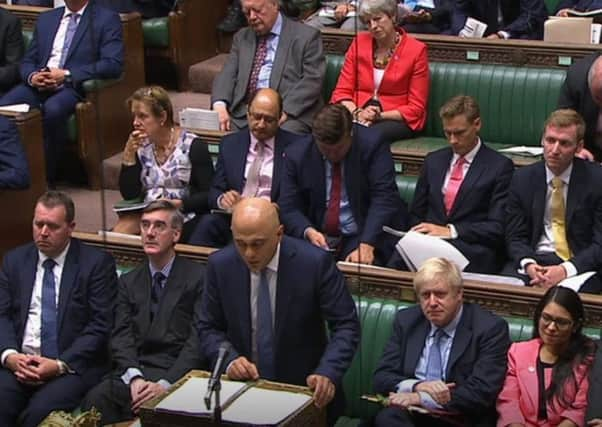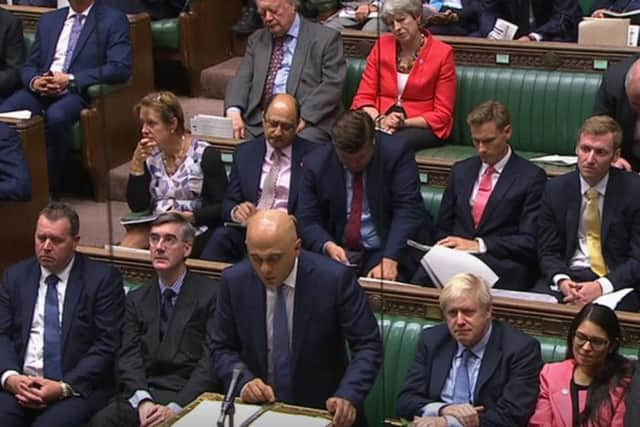What does the Government spending review mean for Scotland?


Mr Javid embarked on a pre-election spending spree, promising cash for health, schools and the police ahead of a snap vote expected as soon as next month amid a growing political crisis.
Scotland will get a £1.2 billion windfall through the Barnett Formula from an overall boost to public spending of £13.4 billion in 2020-21.
Advertisement
Hide AdAdvertisement
Hide AdIn his statement, Mr Javid told MPs: "We are turning the page on austerity and beginning a new decade of renewal.


"A new economic era needs a new economic plan and today we lay the foundations with the fastest increase in day-to-day spending in 15 years."
But shadow chancellor John McDonnell branded the statement a piece of "grubby electioneering" and accused the Government of "pretending to end austerity when they do nothing of the sort".
The Chancellor promised that no Whitehall department will be cut next year, with all ministries having their budget for day-to-day spending increased at least in line with inflation.
As well as plans to add 20,000 police officers and boost spending on health and education in England, Mr Javid said there would be an extra £2.2 billion for the Ministry of Defence to help with a squeeze on defence equipment spending, and £90 million for upgraded diplomatic missions and increased staffing levels to help "seize the opportunities of Brexit".
The Scottish Conservatives welcomed additional Barnett money at a time when the Scottish Government faces a tax revenue shortfall of nearly £1bn.
Scottish Conservative shadow finance secretary Murdo Fraser said: “While the SNP presides over black holes appearing in Scotland’s finances, the UK Government rides to the rescue with more than £1 billion in Barnett Consequentials.
“This is the stark difference between an SNP government which drains money from Scotland’s taxpayers, and a Westminster government which invests in schools, hospitals and police.
Advertisement
Hide AdAdvertisement
Hide Ad“That’s cash that, were they to have their way and separate Scotland from the rest of the UK, they wouldn’t have.
“So instead of constantly moaning about the UK Government, perhaps Nicola Sturgeon should be sending Mr Javid a thank-you note for this latest windfall.”
And the £160m for Scottish farmers was welcomed as a “massive victory” for Scottish Tories, with Borders MP David Mundell the funds “show how Scottish Conservatives are making a difference at Westminster”.
“We demanded a review, it recommended that Scottish farmers received the convergence funding and now that is being carried out,” the former Scottish Secretary said.
But the SNP accused the UK Government of returning money that should have been passed on years ago, and said Whitehall ministers were seeking to direct devolved spending.
SNP MP Deidre Brock said: “Here we have it in black and white – the Tories are conspiring to end devolution as we know it.
“It was the SNP that fought hard to win back the £160 million owed to Scotland’s farmers. We want that money to go straight into their hands.”
Despite the increased spending, Mr Javid insisted "we won't be writing blank cheques".
Advertisement
Hide AdAdvertisement
Hide Ad"We won't be able to afford everything and we'll need to prioritise investment in policies that deliver real productivity gains and boost economic growth in the long-term," he said.
"We'll still need to make difficult choices about our national priorities within a clear set of rules to anchor our fiscal policy and keep control of our national debt."
But he said the fiscal framework would be reviewed at the Budget later this year "to ensure it meets the economic priorities of today, not of a decade ago".
The Chancellor's first major statement was repeatedly criticised by Commons Speaker John Bercow for deviating from the topic of the spending round, straying into comments on Brexit and attacks on Labour.
In his response, Mr McDonnell condemned the "pathetic sums" offered to Whitehall departments that were "on their knees" after almost a decade of austerity.